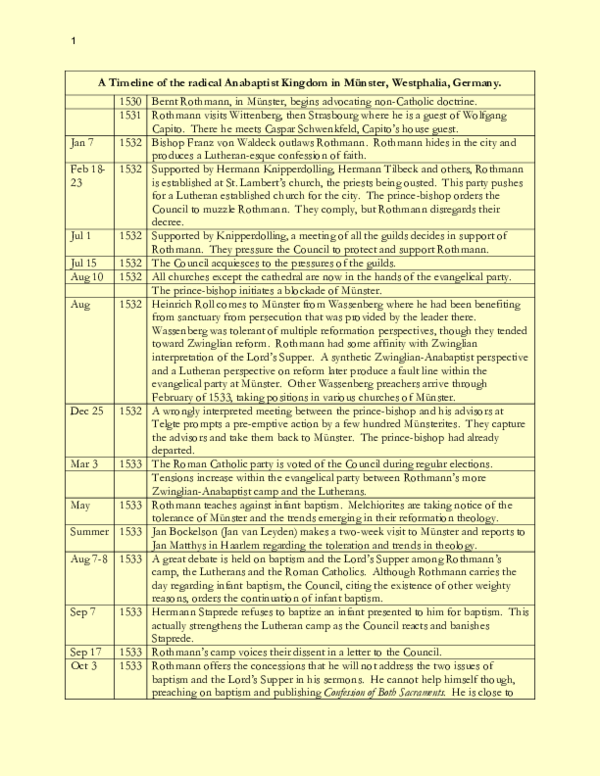Academia.edu no longer supports Internet Explorer.
To browse Academia.edu and the wider internet faster and more securely, please take a few seconds to upgrade your browser.
A Timeline of the radical Anabaptist Kingdom in Münster, Westphalia, Germany
A Timeline of the radical Anabaptist Kingdom in Münster, Westphalia, Germany
A table outlining the dates of key events in the Radical Reformation takeover of Munster and the ensuing siege, conquest and punishment. [Supporting documentation for a PhD seminar presentation on the topic in Spring 2007 for "The Radical Reformation" taught by Rosalie Beck at Baylor University.]
Related Papers
Lived Religion and the Long Reformation in Northern Europe, eds. Sari Katajala-Peltomaa & Raisa Maria Toivo, Brill: Leiden
Appeal and Survival of Anabaptism in Early Modern Germany2017 •
2020 •
It is difficult to say how much the 500th anniversary of the Protestant Reformation stirred up interest in the groundbreaking event, even among church-going Americans. Many in my own denomination, the Apostolic Christian Church of America, reported being unaware of the anniversary, although a few friends did think to buy me a Playmobil Luther, a bobblehead Luther, and a pair of socks imprinted with “Hier stehe ich. Ich kann nicht anders.” There were enough of us interested folks to fill a “Reformation Tour” of central Europe in 2017, and there it was clear that Germans had no intention of forgetting the event, even if they appropriated it for such modern sensibilities as religious tolerance and pluralism. “Whoever believes in diversity must also practice tolerance,” German Chancellor Angela Merkel reminded everyone at an official state function in Wittenberg on October 31, 2017. However much this belief may serve us well now, it was not Martin Luther’s message five hundred years ago...
1989 •
2023 •
A short essay for the Mennnonitischer Geschichtsverein… Series: Gewagt leben! • NOTE: The is a pre-publication draft. The final version will be translated and edited before publication. Please cite the published version, once it is available!
Church History
Patterns of Reform: Continuity and Change in the Reformation Kirk. By James Kirk. Edinburgh: T. T. Clark, 1989. xxii + 518 pp1992 •
Early Modern Ethnic and Religious Communities in Exile. Ed. Yosef Kaplan
Composite Religions and Ideas in Exile. Encounters between Early Saxon Reformers and the First Anabaptists. By Emese Balint and Christopher Martinuzzi2017 •
Central European History
Religion, Government and Political Culture in Early Modern Germany: Lindau, 1520–1628. By Johannes Wolfart. New York: Palgrave. 2002. Pp. xiv + 261. $72.00. ISBN 0-333-73144-12004 •
Arc: The Journal of the School of Religious Studies
The German Peasants' War, edited and trans. by T. Scott and B. Scribner - The Radical Reformation, edited and trans. by M. G. Baylor - The German Peasants' War and Anabaptist Community of Goods, by J. M. StayerThe author in this one submission offers a review of three different books, which all seek to discuss the German Peasants' War of 1524-1525. 1. The German Peasants' War: A History in Documents. Eds. and trans. Tom Scott and Bob Scribner. New Jersey and London: Humanities Press International, Inc., 1991. ISBN 0-391-03681-5. Pp. xvii+355. 2. The Radical Reformation. Ed. and trans. Michael G. Baylor. Cambridge: Cambridge University Press, 1991. ISBN 0-521-37073-6. Pp. xxxvii+295. 3. The German Peasants' War and Anabaptist Community of Goods. By James M. Stayer. Montreal: McGill-Queens University Press, 1991. ISBN 0-7735-0842-2. Pp. x+227.
This essay asks the question, is it useful to approach the Reformation as a phase in a linear chronology, a movement away from the Middle Ages? On the example of Matthias Flacius Illyricus and the formation of Lutheran identity in the third quarter of the sixteenth century, I argue that Protestants had a vested interest in the continuity of their beliefs with medieval thought and culture. The familiar idea of a medieval-Reformation rupture is largely an invention of the nineteenth century. The research of recent decades, which I survey, has shown the limitations of this idea. I conclude with a proposal for seeing cultural change within multiple, overlapping chronologies.
RELATED PAPERS
Spiritual and Cultural Heritage of the Monastery of Studenica: Past, Perseverance, Contemporaneity SASA Gallery of Visual Arts and Music, 13 December 2019 – 31 March 2020, exhibition catalogue, ed. M. Marković, 109–113
CHRIST, ST. JOACHIM, ST. ANNA AND THE KTETORS: KING MILUTIN, AND QUEEN SIMONIDAJournal of Nepal Medical Association
Frequency of Blood Culture Isolates and their Antibiogram in a Teaching Hospital2014 •
The Pan African Medical Journal
Crush syndrome in a case of severe infant physical abuse: a case report2021 •
Current Protocols in Microbiology
Human Norovirus Detection and Production, Quantification, and Storage of Virus‐Like Particles2013 •
2019 •
2022 •
Sistemas Internacionais e Nacionais de Direitos Humanos
Sistemas internacionais e nacionais de direitos humanos2017 •

 Craig R Clarkson
Craig R Clarkson